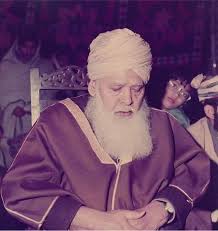Sunni Islamic Scholar, Sufi From Wikipedia, the free encyclopedia
Syed Ahmad Saeed Kazmi (13 March 1913 – 4 June 1986, Urdu: سید احمد سعید کاظمی) was a Pakistani Islamic scholar and Sufi who belonged to the Barelvi movement of Sunni Islam.[1] He migrated to Multan in 1935 from Amroha.[2][3] He is known for his contribution to the Pakistan Movement, Urdu translation and Tafseer of Quran, and Dars-e-Hadith.[4] His tomb sits next to Multan's 18th century Shahi Eid Gah Mosque.[5][6]
This article needs additional citations for verification. (March 2022) |
Ahmad Saeed Kazmi | |
|---|---|
 | |
| Title |
|
| Personal life | |
| Born | 13 March 1913 Amroha, India |
| Died | 4 June 1986 |
| Resting place | Multan |
| Nationality | Pakistani |
| Children | Hamid Saeed Kazmi |
| Region | South Asia |
| Alma mater | Madrasa Mohammadiya, Amroha |
| Known for | Contribution to Pakistan Movement, Urdu translation and Tafseer of Quran, Dars-e-Hadith |
| Religious life | |
| Religion | Islam |
| Denomination | Sunni |
| Jurisprudence | Hanafi |
| Tariqa | Qadri |
| Creed | Maturidi |
| Movement | Pakistan Movement |
Ahmed Saeed Kazmi was born to Syed Muhammad Mukhtaar Ahmad Shah Kazmi in Amroha, Uttar Pradesh. he got his basic education from his mother. Later on his uncle gave him Sanad-e-Hadith and spiritual education which polished his Allah gifted qualities.[7]
Seamless Wikipedia browsing. On steroids.